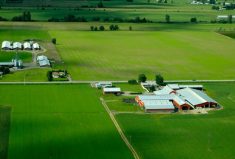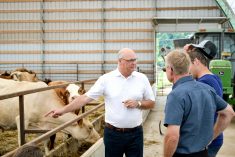Glacier FarmMedia – A federal loan program for women offered through Farm Credit Canada is so popular that it will spend double the amount originally budgeted.
Why it matters: Diversity in agriculture helps bring more qualified workers into the sector.
The FCC Women Entrepreneur Program was originally a $500 million investment over three years, but federal agriculture minister Marie-Claude Bibeau said last week that 1,391 loans have been approved so far, requiring $994.5 million.
“It’s very exciting to see that so many women have applied to this special fund for women entrepreneurs, enough for us to even invest double,” she said.
Read Also

Ontario’s agri-food sector sets sights on future with Agri-Food 2050 initiative
The first-ever Agri Food 2050, a one-day industry event dedicated to envisioning the future of food and farming in Ontario,…
The program was launched in March 2019 and offers financing, resources and mentorship to participants.
“It was a real need,” Bibeau said of the overwhelming response. “Women are facing more barriers than men when they want to enter into business generally and in agriculture is no different.”
Bibeau was an entrepreneur before entering politics and says she knows what she’s talking about. Women worry about the usual challenges of work-life balance but they also have more difficulty accessing capital.
“Women don’t always have all the networks and the mentorship to encourage them to move forward,” she said.
Applications to the program were diverse, from primary producers to food processors.
Bibeau pointed to homemade food products that women often start to sell from their own kitchens. As those products become more successful in the marketplace the producers have to move to commercial kitchens, a significant investment.
There is still a difference in how the business world treats women and Bibeau said that’s why special programs strictly for women are required.
She has pledged to include more women in the sector.
Bibeau also met last week with female entrepreneurs from across the food chain to discuss the challenges and opportunities they face.
She said women have a responsibility to each other.
“I think we have a role to play when we break glass ceilings to open the doors to others and we should never take anything for granted,” she said.
During roundtable discussion she heard about the work-life balance and how women still feel responsible for the family, dealing with schools and sports, and in many cases the household finances.
Bibeau said women tell her they’d like to be more involved in agricultural organizations but don’t always feel welcome.
“When I meet with what we call the stakeholders…they are mainly men,” Bibeau said. “I think they have to acknowledge it’s good for the organization to have a diversity around their table, but they have to be proactive and welcome them. Some are doing very good work. Others are not so open and I could feel it.”
The minister said through FCC and other programs the government wants to make sure women can develop the skills they need to move forward, find mentors, and learn how to run a business.
Women have been active members of family farms forever, she added, so they should be more involved in other aspects of agriculture.
According to government statistics, women represented just more than a quarter of farm operators in 1996 and nearly 29 per cent 20 years later. In 2016, there were about 77,830 female farm operators.
This article was originally published at The Western Producer.














